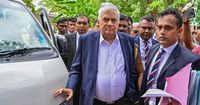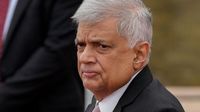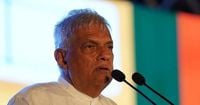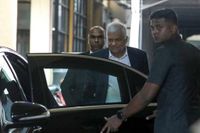On August 22, 2025, Sri Lanka found itself at the center of a political storm as former President Ranil Wickremesinghe was arrested in Colombo on allegations of misusing public funds during his tenure from 2022 to 2024. The arrest, which marks the first time a former Sri Lankan head of state has been taken into custody, sent shockwaves through the island nation’s political landscape and reignited debates over accountability, justice, and the legacy of its recent economic crisis.
According to police statements reported by the Associated Press and Reuters, Wickremesinghe, now 76, was detained by the Financial Crimes Investigations Department and brought before a magistrate court in the capital. The court ordered that he be held in custody until August 26, pending a fresh hearing into the allegations. Police spokesperson F.U. Wootler told Reuters, "Former President Ranil Wickremesinghe has been arrested and produced in court. He will be in remand custody till August 26."
The case centers on a 2023 trip that Wickremesinghe made to London, where he attended a University of Wolverhampton ceremony honoring his wife, Prof. Maithree Wickremesinghe, who received an honorary professorship. The trip followed an official visit to Havana for the G77 summit, and investigators allege that Wickremesinghe used approximately 17 million Sri Lankan rupees—about $56,000—in state funds to cover travel expenses for what they describe as a private family event. The Criminal Investigation Department also claims that government money was used to pay for his bodyguards during the London detour.
Wickremesinghe, who did not comment during the hearing and whose office did not respond to requests for comment, has denied any wrongdoing. His office previously asserted that his wife’s travel expenses were covered privately and that no state funds were misused. Nevertheless, the allegations have persisted, and three of his senior aides were questioned by the Criminal Investigation Department earlier this month.
The arrest comes amid a sweeping anti-corruption campaign led by President Anura Kumara Dissanayake, who assumed power in September 2024 after defeating Wickremesinghe in the presidential election. Dissanayake and his National People’s Power coalition ran on a platform promising to root out corruption and bring accountability to Sri Lanka’s political elite. According to The New York Times, Dissanayake’s election was widely seen as a repudiation of what many Sri Lankans viewed as the old guard responsible for the country’s economic collapse.
The new administration wasted little time. In the six months since Dissanayake took office, 63 individuals—including politicians, their relatives, and government officials—have been arrested on charges related to bribery and corruption, Prime Minister Harini Amarasuriya told Parliament earlier this month. More than a dozen former high-ranking officials and political leaders remain under investigation, as reported by the Associated Press.
The backdrop to these dramatic events is Sri Lanka’s recent history of economic hardship. The country’s crisis began in 2019, exacerbated by a combination of government mismanagement under then-President Gotabaya Rajapaksa, the devastating 2019 terrorist bombings, and the COVID-19 pandemic, which crippled the vital tourism sector. By 2022, Sri Lanka’s foreign reserves had dwindled to the point where the government could no longer import essential goods like fuel, triggering mass protests and the eventual resignation of Rajapaksa.
Wickremesinghe, a seasoned politician and leader of the United National Party since 1994, stepped into the void. He was appointed prime minister after Rajapaksa’s departure and then secured the presidency through a parliamentary vote in July 2022. Wickremesinghe, who has served as prime minister a record six times, was credited by many international observers for stabilizing Sri Lanka’s economy during its darkest hours. He negotiated a $2.9 billion bailout from the International Monetary Fund in early 2023, a deal that required the implementation of tough austerity measures such as doubling taxes and removing energy subsidies.
These policies, while credited with reducing inflation, strengthening the local currency, and rebuilding foreign reserves, proved deeply unpopular at home. Many Sri Lankans blamed Wickremesinghe for the pain of higher taxes and utility rates, and his association with the previous administration left him vulnerable to accusations that he represented the old political order. In the 2024 presidential election, he finished third behind Dissanayake and opposition leader Sajith Premadasa.
The arrest has sparked fierce debate within Sri Lanka. Supporters of Wickremesinghe gathered outside the court in Colombo to protest what they see as a politically motivated attack. His United National Party ally, Nishantha Sri Warnasinghe, told reporters outside the courthouse, "Ranil Wickremesinghe has never misused public funds or state funds. He was the person who stepped up and accepted the challenge to save this country when the economy collapsed. That is the person who is being treated like this today by this government." Warnasinghe’s comments echo the concerns of many in Wickremesinghe’s camp, who suggest the case is less about financial impropriety and more about settling political scores.
Yet, for others, the arrest is a sign that Sri Lanka’s new leadership is serious about tackling the endemic corruption that has plagued the nation’s politics for decades. President Dissanayake’s supporters argue that the crackdown is long overdue and that no one, not even a former president, should be above the law. The government’s anticorruption drive has drawn both praise and skepticism, with some observers warning that the true test will be whether these efforts lead to lasting structural change or simply become another chapter in Sri Lanka’s cycle of political retribution.
Wickremesinghe’s rise and fall are emblematic of Sri Lanka’s turbulent political history. Born into a prominent family with deep political and media ties, he was made the country’s youngest cabinet minister in 1978 and has been a fixture in public life ever since. His leadership during the economic crisis, while praised abroad, failed to translate into lasting political support at home—a reality that now leaves him fighting for his reputation and freedom.
As the next court hearing looms on August 26, Sri Lankans are watching closely. The outcome could shape not just Wickremesinghe’s fate, but also the trajectory of the country’s efforts to rebuild trust in its institutions and move beyond a legacy of crisis and corruption.



